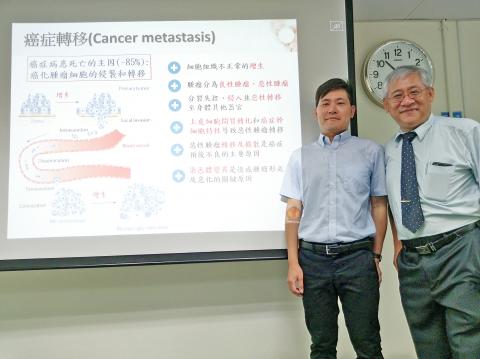Taiwanese researchers have become the first in the world to pin down a gene key to triggering metastasis of cancer cells, scientists at Academia Sinica announced yesterday.
The gene, known as paraspeckle component 1 — or PSPC1 — causes the metastasis of cancer in 60 percent to 70 percent of human patients, Jou Yuh-shan (周玉山), a research fellow at Academia Sinica’s Institute of Biomedical Sciences, told a news conference in Taipei.
In early-stage cancer, the condition affects only a localized part of the body, but when cancer spreads, the diagnosis changes to stage three or stage four, signifying that cancer cells are growing and spreading through blood vessels, he said.

Photo: Wu Liang-yi, Taipei Times
Stage three and stage four cancer is marked by the progression of cancer into other parts of the body, resulting in a deterioration of health and eventual death, he said.
After a decade of research, his team has identified PSPC1 as the gene that plays a crucial role in metastasis and controls the functions of other genes in cancer cells, such as inhibiting apoptosis, or natural cell death, he said.
Large-scale expression of PSPC1 is present in 60 percent to 70 percent of late-stage cancers, including breast, liver, lung and prostate cancers, he said.
PSPC1 not only augments the generation of cancer cells, but it also enables metastasis by imparting mobility and stem-cell like characteristics to normal cells, resulting in a superior growth rate and the drug resistance of cancer cells, he said.
Furthermore, the gene alters the cell’s cytokines to produce growth factor beta 1, also known as TGF-beta 1, which regulates apoptosis, he said.
In its altered state, the factor instead prolongs the lifespan and reproduction of cancer cells, he said.
The rate of PSPC1 expression is exceedingly low in healthy human beings, while high rates of its expression correspond with cancer that is reproducing and metastasizing, he said.
“In elucidating PSCS1 functionality and TGF-beta 1 behavior in metastasizing cancer, this research represents a major breakthrough,” Jou said.
The team’s study was published in the journal Nature Cell Biology on March 28.
The research team has identified an inhibitor of PSPC1 that has potential medical value, but its development for actual application in cancer treatment could take between 10 and 20 years, he said.

Seventy percent of middle and elementary schools now conduct English classes entirely in English, the Ministry of Education said, as it encourages schools nationwide to adopt this practice Minister of Education (MOE) Cheng Ying-yao (鄭英耀) is scheduled to present a report on the government’s bilingual education policy to the Legislative Yuan’s Education and Culture Committee today. The report would outline strategies aimed at expanding access to education, reducing regional disparities and improving talent cultivation. Implementation of bilingual education policies has varied across local governments, occasionally drawing public criticism. For example, some schools have required teachers of non-English subjects to pass English proficiency

‘FORM OF PROTEST’: The German Institute Taipei said it was ‘shocked’ to see Nazi symbolism used in connection with political aims as it condemned the incident Sung Chien-liang (宋建樑), who led efforts to recall Democratic Progressive Party (DPP) Legislator Lee Kun-cheng (李坤城), was released on bail of NT$80,000 yesterday amid an outcry over a Nazi armband he wore to questioning the night before. Sung arrived at the New Taipei City District Prosecutors’ Office for questioning in a recall petition forgery case on Tuesday night wearing a red armband bearing a swastika, carrying a copy of Adolf Hitler’s Mein Kampf and giving a Nazi salute. Sung left the building at 1:15am without the armband and apparently covering the book with a coat. This is a serious international scandal and Chinese

TRADE: The premier pledged safeguards on ‘Made in Taiwan’ labeling, anti-dumping measures and stricter export controls to strengthen its position in trade talks Products labeled “made in Taiwan” must be genuinely made in Taiwan, Premier Cho Jung-tai (卓榮泰) said yesterday, vowing to enforce strict safeguards against “origin laundering” and initiate anti-dumping investigations to prevent China dumping its products in Taiwan. Cho made the remarks in a discussion session with representatives from industries in Kaohsiung. In response to the US government’s recent announcement of “reciprocal” tariffs on its trading partners, President William Lai (賴清德) and Cho last week began a series of consultations with industry leaders nationwide to gather feedback and address concerns. Taiwanese and US officials held a videoconference on Friday evening to discuss the

PERSONAL DATA: The implicated KMT members allegedly compiled their petitions by copying names from party lists without the consent of the people concerned Judicial authorities searched six locations yesterday and questioned six people, including one elderly Chinese Nationalist Party (KMT) member and five KMT Youth League associates, about alleged signature forgery and fraud relating to their recall efforts against two Democratic Progressive Party (DPP) legislators. After launching a probe into alleged signature forgery and related fraud in the KMT’s recall effort, prosecutors received a number of complaints, including about one petition that had 1,748 signatures of voters whose family members said they had already passed away, and also voters who said they did not approve the use of their name, Taipei Deputy Chief Prosecutor